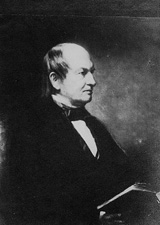
The 1816 United States presidential election was the eighth quadrennial presidential election. It was held from November 1 to December 4, 1816. In the first election following the end of the War of 1812, Democratic-Republican candidate James Monroe defeated Federalist Rufus King. The election was the last in which the Federalist Party fielded a presidential candidate.

Elisha Reynolds Potter was a statesman in the Federalist Party from Kingston, Rhode Island, who served several times as the Speaker in the Rhode Island State Assembly.
These are tables of congressional delegations from Rhode Island to the United States Senate and United States House of Representatives.

John Holmes was an American politician. He served as a U.S. Representative from Massachusetts and was one of the first two U.S. senators from Maine. Holmes was noted for his involvement in the Treaty of Ghent.
The 1816–17 United States House of Representatives elections were held on various dates in various states between April 30, 1816 and August 14, 1817. Each state set its own date for its elections to the House of Representatives before the first session of the 15th United States Congress convened on December 1, 1817. The size of the House increased to 184 after Indiana and Mississippi achieved statehood.
Job Durfee was a politician and jurist from Rhode Island. Born at Tiverton, he graduated from Brown University in 1813 and was admitted to the bar and commenced practice in Tiverton. He was a member of the Rhode Island House of Representatives from 1816 to 1820, and was elected as a Democratic-Republican to the Seventeenth Congress and was reelected as an Adams-Clay Republican to the Eighteenth Congress, serving from March 4, 1821 to March 3, 1825. He was an unsuccessful candidate for reelection in 1824 to the Nineteenth Congress and for election in 1828 to the Twenty-first Congress; he was again a member of the State house of representatives from 1826 to 1829, serving as speaker from 1827 to 1829. He declined to be a candidate for reelection and resumed the practice of law; in May 1833 he was elected associate justice of the Rhode Island Supreme Court. He was chief justice from June 1835 until his death in Tiverton in 1847. As chief justice, he presided over the trial of the last person executed in Rhode Island, John Gordon. Durfee's interment was in the family burying ground at Quaker Neck, near Tiverton.

Benjamin Adams was an American lawyer and politician.
Stephen Bullock was a United States representative from Massachusetts. Born in Rehoboth in the Province of Massachusetts Bay, he attended the common schools, taught school, and was a captain of the Sixth Company in Col. Thomas Carpenter III's Regiment of Massachusetts militia during the Revolutionary War, and was in the Battle of Rhode Island in 1778. He was a delegate to the first State constitutional convention in 1780 and was a member of the Massachusetts House of Representatives in 1783, 1785, 1786, 1795, and 1796.

David Rogerson Williams was a representative in the United States Congress and the 45th governor of South Carolina from 1814 to 1816.
John Bailey was an American politician who served as a member of the United States House of Representatives from Massachusetts for three terms and part of a fourth from 1824 to 1831.
Thomas Hale Sill was a Jacksonian and National Republican member of the U.S. House of Representatives from Pennsylvania.

William Channing Gibbs was the tenth Governor of Rhode Island from 1821 to 1824.

Nathan Fellows Dixon was an attorney and bank president from Westerly, Rhode Island. The son of Nathan F. Dixon and father of Nathan F. Dixon III, he was best known for his service as a United States representative from Rhode Island from 1849 to 1851, and again from 1863 to 1871.

Albert Collins Greene was an American lawyer and politician from Rhode Island. He served as a United States senator and Attorney General of Rhode Island.

The 2018 United States House of Representatives elections in Rhode Island were held on November 6, 2018, to elect the two U.S. representatives from the state of Rhode Island, one from each of the state's 2 congressional districts. The election coincided with the 2018 U.S. mid-term elections, as well as other elections to the House of Representatives, elections to the United States Senate and various state and local elections. The primaries took place on September 12.

The 2020 United States House of Representatives elections in Rhode Island was held on November 3, 2020 to elect the two U.S. representatives from the state of Rhode Island, one from each of the state's 2 congressional districts. The elections will coincide with the 2020 U.S. presidential election, as well as other elections to the House of Representatives, elections to the United States Senate and various state and local elections.

The 1816 Rhode Island gubernatorial election was held on April 17, 1816.

The 1816 New Hampshire gubernatorial election was held on March 12, 1816.

The 2022 Rhode Island House of Representatives elections took place on November 8, 2022. Primary elections were held on September 13, 2022. Rhode Island voters elected state representatives in all 75 seats of the House of Representatives to serve two-year terms.
This page is based on this
Wikipedia article Text is available under the
CC BY-SA 4.0 license; additional terms may apply.
Images, videos and audio are available under their respective licenses.













